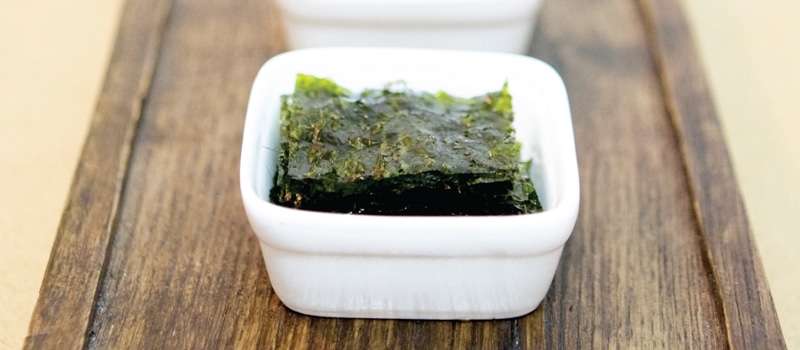There are a lot of Korean food menu cooked with laver. I’d like to introduce its nutritional information, and recommend it to use when you cook.
Laver Nutritional Information
Laver contains many vitamins and minerals as well as being low-calorie, low-sodium, low sugar, gluten-free, dairy-free, egg-free, and part of a high-fiber diet. No cholesterol, artificial flavors, colorings, or preservatives are used in producing laver, making it a healthy addition to your diet no matter your eating restrictions.Laver contains 40% protein and all eight essential amino acids. A perfect snack, seasoned laver has one quarter of the calories and one-third of the sodium content of a hundred gram serving of potato chips.
Mineral and Vitamin Benefits of Laver
Vitamin A and Beta Carotene
Beta carotene is known as pro-vitamin A, and is converted by the body into retinols, which promote night vision adaptation. Vitamin A promotes the growth of embryonic cells, and strong hair, nails, and ‘skin.
Vitamin C
Laver contains more than the necessary daily intake of Vitamin C, which promotes the body’s immune system, helps the body build scar tissue, and build new tissue. Vitamin C also helps prevent anemia and gingivitis.
Calcium
If the body lacks Vitamin D, it is unable to absorb calcium, leading to a lack of calcium which has been shown to cause osteoporosis.
Iron
Iron is important to prevent iron deficiency anemia, which causes fatigue and shortness of breath since the blood is unable to carry enough oxygen through the blood stream.
Iodine
Iodine has been found to reduce the risk of breast cancer. Iodine helps the body detoxify and remove metals and bromides from the body, while strengthening the immune system and preventing the growth of abnormal bacteria in the stomach. According to The World Health Organization, a lack of iodine in pregnant women is the leading cause of preventable brain damage in children. Americans lack iodine in their diet since their primary source of iodine is from iodized salt which is only used occasionally.


